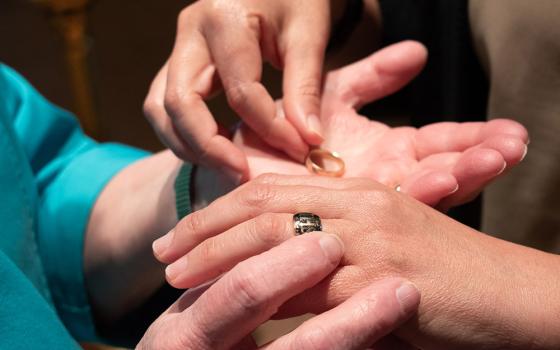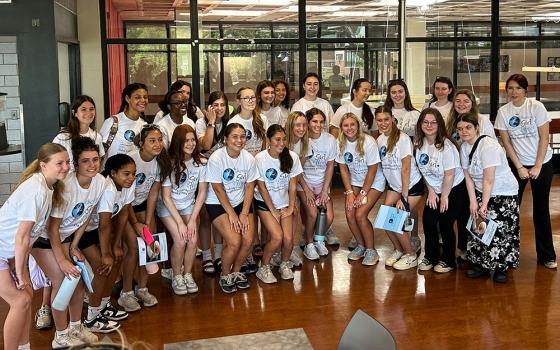
The Spirit of God is "one" and makes us "one." The three religions present in the place of conflict (Judaism, Christianity, Islam) are the religions of the "book." (Photo: Unsplash)
After reading Chris Herlinger's news story in GSR entitled "Ukrainians fleeing terror find solace in a Polish church," I am left with a lingering sense of sadness that permeates the entire text. Simultaneously, I feel grateful for the places and communities that extend a welcoming embrace, providing a space of silence in which to express and pour out the pain.
First and foremost, I would like to express my gratitude to Chris for his masterful work, which skillfully immerses us into a liturgical experience, especially within the Orthodox tradition. The meticulously crafted aesthetics, the abundance of candles, beautiful icons, chants and incense all contribute to this experience.
The combination of the mystical beauty of the sacred places with the indescribable pain of the people intertwines in my body and spirit, leaving me in prayer alongside them — saddened with those who mourn and hopeful with all of them.
Additionally, to this portrayal, we must now add the current situation in Palestine-Israel. The images and news are so incomprehensible that I find myself at a loss for words to articulate the feelings of horror and pain they evoke in a disbelieving humanity witnessing the escalation of barbarism among brothers.
"We are all 'one' and the Ruah unites us as siblings. We earnestly seek shalom for all — peace. It's challenging to find peace when just a few hundred kilometers away, brothers and sisters kill 700 people in one day.": Sr. Magda Bennásar on Palestine-Israel conflict
Perhaps, being silent is the best and most congruent attitude. We all pray to the same God, seeking the same divine assistance. It is madness to believe that the God of one religion is different from the God of another. The Spirit of God is "one," making us brothers, loving us, and uniting us. And God suffers. The divine presence suffers with every person and living being enduring suffering. The three religions present in the place of conflict (Judaism, Christianity, Islam) are the religions of the "book."
In Europe, we feel that both conflicts, the one in Ukraine and the one in the Middle East, are very close. People who have fled Ukraine and other countries walk our streets; their children attend our schools, and some seek refuge in our churches. Many religious men and women have left their convents empty to accommodate refugees from Ukraine.
In times of pain, discussions tend to fade, and religious discourse becomes less filtered. Ultimately, at the moment of truth, we all converge into the current of "life," the Spirit or Ruah inherited from Judaism, which has taken various faces and forms across cultures, much like the diverse faces of siblings from the same parents.
It is precisely during times of crisis that people unite. This serves as an opportunity for all of us to connect with the flow of the water of "life" and, from that inner space, let go of grievances and conflicts.
These days, I find myself recalling the experience of praying one night at the Wailing Wall in Jerusalem, a journey that involved passing through checkpoints with machine guns and weapon detectors. Upon reaching the women's wall, I sat in silent contemplation. Gradually, I joined a group of women who were engaged in silent prayer or crying.
I recall the color of the wall, the smell of earth, and the sound of a woman weeping, her head leaning against the wall, as she poured out her pain and her love to the God of Israel. I can still see with the eyes of my heart the hundreds of rolled-up slips of paper, placed between the bricks, resembling a mosaic of prayer on the ancient wall of pain and love. God's presence is felt and celebrated there.
A few years ago, as a teacher in a middle-class high school that included North African students, I was on duty at an ungodly hour, when it is impossible for young people to focus on their work.
In my role as a religion teacher, I typically didn't have the chance to enjoy the presence of the Maghrebi students due to religious differences. However, this particular situation presented a unique opportunity. I decided to organize a question-and-answer session with the entire class, and the level of mutual curiosity was impressive!
The game of questions began, and suddenly, the three Muslim girls shared that they rise at 5 a.m. to pray with their entire family, observe fast during Ramadan, give alms, and welcome the poor.
The atmosphere in the on-call room was one of total anticipation; the exclamations from the Spanish girls were constant, indicating their shock. The Spanish students had never inquired about the lives of the Maghrebi girls or paid attention to them, and now they were listening to them with absolute interest. Suddenly, individuals who were previously overlooked due to their origin or headscarfs became the center of attention for everyone.
The guard duty ended and the Muslim girls became my best friends at the center. I appreciated their simplicity and complicity. We were united by the same Spirit, shared the same love, prayed at the same time, and connected from within. Even today, after all these years, I still remember them fondly and thank them for their closeness and kindness.
"In times of pain, discussions tend to fade, and religious discourse becomes less filtered. Ultimately, at the moment of truth, we all converge into the current of 'life,' the Spirit or Ruah.": Sr. Magda Bennásar on Palestine-Israel conflict
Years ago, while studying theology in Berkeley, USA, the liturgy professor tasked us, as part of our reflection and study, with attending liturgies from various Christian churches. I had remarkable experiences, such as witnessing the first Eucharist celebrated by a Franciscan Episcopalian nun at Grace Cathedral in San Francisco.
During my time in San Francisco, I also attended a Greek Orthodox liturgy. There, I discovered that Orthodox Christians rely less on words, as Western Christians do, and instead engage more with their senses through the experience created by the aesthetics in their temples.
During the liturgy, long chants take the form of prayers, resonating in a semi-dark temple filled with the aroma of incense and the glow of numerous lit candles. This powerful effect creates a sense of intimacy and deep contemplation. The temple itself is adorned with icons of profound beauty that seem to pierce the soul.
Throughout the liturgy, individuals move about, approaching the icons to light candles, except during the proclamation of the Gospel. At that moment, the entire assembly gathers around a pulpit situated in the center of the temple. The congregation stands in an attitude of attentive listening, surrounded by a profound silence in which the proclamation of the Word echoes, in a way that sends shivers down one's spine. The respect, listening, and spiritual thirst of the people permeate the atmosphere.
Advertisement
We would often run off to the synagogue on the Sabbath whenever possible. Later, in Boston, I attended several times with my community to listen to the rabbi. This wasn't prompted by the liturgy teacher; it was simply a joy to hear that young woman — a poet and writer with a remarkable gift for communication. Notably different from many less vibrant parishes, the rest of the liturgy was intriguing and distinct, but this isn't the place to delve into further details. Nevertheless, in my heart, I carry expressions from the three major religions currently facing challenges in the Middle East.
We are all "one," and the Ruah unites us as siblings. We earnestly seek shalom for all — peace. It's challenging to find peace when just a few hundred kilometers away, brothers and sisters are taking the lives of 700 people in a single day, and several thousand within a week. Where is your brother and sister?
What does Yahweh-Jesus-Allah say?
My prayer and lament echo from that invisible wall that separates us, and from the Spirit-Ruah that makes us "one."
This column was originally published in Spanish on Nov. 15, 2023.










